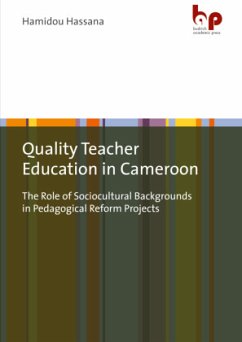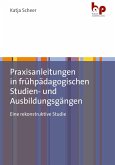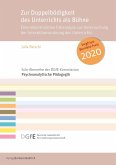Hamidou Hassana
Quality Teacher Education in Cameroon
The Role of Sociocultural Backgrounds in Pedagogical Reform Projects
Hamidou Hassana
Quality Teacher Education in Cameroon
The Role of Sociocultural Backgrounds in Pedagogical Reform Projects
- Gebundenes Buch
- Merkliste
- Auf die Merkliste
- Bewerten Bewerten
- Teilen
- Produkt teilen
- Produkterinnerung
- Produkterinnerung
Eine qualitätsorientierte Lehrer_innenbildung verbessert die Qualität von Lehr- und Lernprozessen. Welche Rolle spielt dabei der soziokuklturelle Hintergrund? Das Buch beleuchtet, wie der soziokulturelle Hintergrund der Akteur_innen die Qualität der Lehrer_innenausbildung im Rahmen eines pädagogischen Reformprojekts mit Teilnehmer_innen aus Kamerun und Deutschland beeinflusst. Die Analyse und Interpretation qualitativer Daten zeigt, dass die soziokulturellen Hintergründe der Akteur_innen wichtige Faktoren sind, die den internationalen, interkulturellen Dialog über Lehrer_innenbildung sowie die…mehr
Andere Kunden interessierten sich auch für
![Praxisanleitungen in frühpädagogischen Studien- und Ausbildungsgängen Praxisanleitungen in frühpädagogischen Studien- und Ausbildungsgängen]() Katja ScheerPraxisanleitungen in frühpädagogischen Studien- und Ausbildungsgängen46,00 €
Katja ScheerPraxisanleitungen in frühpädagogischen Studien- und Ausbildungsgängen46,00 €![Kinder als Akteure nachhaltiger Entwicklung Kinder als Akteure nachhaltiger Entwicklung]() Barbara BenoistKinder als Akteure nachhaltiger Entwicklung36,90 €
Barbara BenoistKinder als Akteure nachhaltiger Entwicklung36,90 €![Funktionalität von Kultur in der Weltgesellschaft Funktionalität von Kultur in der Weltgesellschaft]() Barbara Conrad-GrünerFunktionalität von Kultur in der Weltgesellschaft59,00 €
Barbara Conrad-GrünerFunktionalität von Kultur in der Weltgesellschaft59,00 €![Schulvorbereitung und kindliche Akteurschaft Schulvorbereitung und kindliche Akteurschaft]() Katharina NicolaiSchulvorbereitung und kindliche Akteurschaft39,90 €
Katharina NicolaiSchulvorbereitung und kindliche Akteurschaft39,90 €![Konstituierende Rahmung und professionelle Praxis Konstituierende Rahmung und professionelle Praxis]() Konstituierende Rahmung und professionelle Praxis39,90 €
Konstituierende Rahmung und professionelle Praxis39,90 €![Zur Doppelbödigkeit des Unterrichts als Bühne Zur Doppelbödigkeit des Unterrichts als Bühne]() Julia ReischlZur Doppelbödigkeit des Unterrichts als Bühne49,90 €
Julia ReischlZur Doppelbödigkeit des Unterrichts als Bühne49,90 €![Spielräume der Ordnungen Spielräume der Ordnungen]() Serafina MorrinSpielräume der Ordnungen75,00 €
Serafina MorrinSpielräume der Ordnungen75,00 €-
-
-
Eine qualitätsorientierte Lehrer_innenbildung verbessert die Qualität von Lehr- und Lernprozessen. Welche Rolle spielt dabei der soziokuklturelle Hintergrund? Das Buch beleuchtet, wie der soziokulturelle Hintergrund der Akteur_innen die Qualität der Lehrer_innenausbildung im Rahmen eines pädagogischen Reformprojekts mit Teilnehmer_innen aus Kamerun und Deutschland beeinflusst. Die Analyse und Interpretation qualitativer Daten zeigt, dass die soziokulturellen Hintergründe der Akteur_innen wichtige Faktoren sind, die den internationalen, interkulturellen Dialog über Lehrer_innenbildung sowie die Lehr-Lern-Interaktionsdynamik im Klassenzimmer beeinflussen. Das Buch erörtert darüber hinaus den Einfluss soziokultureller Kontexte auf einen lerner_innenorientierten Unterricht, der auf den Prinzipien von Vielfalt, Interaktion und gegenseitiger Verantwortung beruht.
Hinweis: Dieser Artikel kann nur an eine deutsche Lieferadresse ausgeliefert werden.
Hinweis: Dieser Artikel kann nur an eine deutsche Lieferadresse ausgeliefert werden.
Produktdetails
- Produktdetails
- Verlag: Budrich Academic Press / Verlag Barbara Budrich
- Artikelnr. des Verlages: 12081
- Seitenzahl: 390
- Erscheinungstermin: 7. September 2022
- Englisch
- Abmessung: 29mm x 150mm x 217mm
- Gewicht: 690g
- ISBN-13: 9783966650526
- Artikelnr.: 63751998
- Herstellerkennzeichnung Die Herstellerinformationen sind derzeit nicht verfügbar.
- Verlag: Budrich Academic Press / Verlag Barbara Budrich
- Artikelnr. des Verlages: 12081
- Seitenzahl: 390
- Erscheinungstermin: 7. September 2022
- Englisch
- Abmessung: 29mm x 150mm x 217mm
- Gewicht: 690g
- ISBN-13: 9783966650526
- Artikelnr.: 63751998
- Herstellerkennzeichnung Die Herstellerinformationen sind derzeit nicht verfügbar.
Dr. Hamidou Hassana is Assistant Lecturer at the University of Hamburg, Germany.
DedicationAcknowledgments1 Introduction: The Problem of Sociocultural Backgrounds (SCBs) and Quality Teacher Education (QTE) in Cameroon, Africa1.1 Introductory remarks about QTE reforms in Cameroon, Africa1.2 Preliminary Backgrounds of the Pedagogical Reform Principles of the UEC1.3 Empiric Introduction to the Problem of the Study1.4 The Problem of the Study, Related Research Questions, and the Scope1.5 Interest and Significance of the Study1.6 Organization of the BookPart 1: Contextual and Theoretical Frameworks of the Concepts of Sociocultural Backgrounds and Quality Teacher Education in Cameroon, Africa2 Understanding the Concepts of Sociocultural Backgrounds (SCBs) and Quality Teacher Education (QTE) from a Theoretical Perspective of Bildung as a Transformative Process, according to and beyond Bourdieu's Theory of Habitus and Capital Forms2.1 Understanding the Concepts of SCBs and QTE within the Complex Multi-Cultural Context of Cameroon, Africa2.2 SCBs and the QTE in Cameroon, Africa: An Empiric Research Perspective of the Theory of Bildung as a Transformative Process (BTP)2.3 SCBs as World-Self-Relations, Habitus, Frame of Orientation, Social and Cultural Capitals and the Conjunctive Space of Experience?3 General Trends in Education, Teacher Education Reforms in Cameroon3.1 An Overview of the Educational Systems in Cameroon3.2 Some Reforms of the Education Systems in Cameroon3.3 The Teacher Education Systems in Cameroon4 Reconstructing and Discussing Pedagogical Reform Ideas Sustaining the EEC Educational Projects in Mbouo4.1 Backgrounds to the Pedagogical Reform Principles of IPSOM-UEC4.2 Principle of the Diversity of Meaning vs. the Principle of Unique Meaning (Sens Divers vs. Sens Unique)4.3 The Development of the Principe d'Interaction (Principle of Interaction) in EP-ER, IPSOM-UEC4.4 The Development of the Principe de la Responsabilité Réciproque (Principle of Reciprocal or Corporate Responsibility)5 Reconstructing the Development Process of the Pedagogical Reform Projects of EEC in Mbouo-Bandjoun5.1 The Project Ecole Pilote (EP) and Ecole de Référence (ER) of Mbouo5.2 The Project IPSOM5.3 The UEC's Development from the SCB of Power Relations5.4 Conjugation of Individual Interests as a Building Block of the Projects?6 The Reception of the Pedagogical Reform Ideas in EP-ER and IPSOM-UEC6.1 Moukoko Priso's Contribution to the Discussion and Development of the Pedagogical Reform Principles at the UEC6.2 Philosophical Reflection on the Principles6.3 Pedagogical and Didactic Contributions to the Discourse on the Principles6.4 Fonssi's Contribution to the Conceptualization of the Principles6.5 Practical Mechanisms Claimed to Sustain the Founding Principles of the UECPart 2: A Qualitative Study of Features of SCBs and their Significance for QTE in Cameroon: An Empiric Reconstructive Analysis of Classroom Activities and Autobiographical Narrations7 Methodological Framework7.1 The Empiric Reconstructive Research Perspective of the Study7.2 A Perspective of a Sequential Analysis of the Documentary Method7.3 The Perspective of the Inference Analysis7.4 Research Design8 Empirical Analysis and Interpretation of the SCBs of the Actors Involved in a Class Conference Session in Class 4 of Monsieur Paul (MP)8.1 Formulating Interpretations8.2 Reflecting Interpretation8.3 Significance of the SCBs of the Participants of the Class Conference in Shaping the Classroom Action/Interactions9 Group Discussion with MP and MT: How Could "Arranger" Reflect the actors' SCBs in the Group Interaction and the Communal Decision-Making Process?9.1 Formulating Interpretation9.2 Reflecting Interpretation9.3 The Significance of SCBs in Structuring the Group Discussion and Informing on the Frame of Orientation of Problem-Solving or Decision-Making Practices10 Reconstructing the Frames of Orientation of the Sens Unique and the Sens Divers in the Lesson of MT in class 6: "L'o ne s'aire a rin"10.1
DedicationAcknowledgments1 Introduction: The Problem of Sociocultural Backgrounds (SCBs) and Quality Teacher Education (QTE) in Cameroon, Africa1.1 Introductory remarks about QTE reforms in Cameroon, Africa1.2 Preliminary Backgrounds of the Pedagogical Reform Principles of the UEC1.3 Empiric Introduction to the Problem of the Study1.4 The Problem of the Study, Related Research Questions, and the Scope1.5 Interest and Significance of the Study1.6 Organization of the BookPart 1: Contextual and Theoretical Frameworks of the Concepts of Sociocultural Backgrounds and Quality Teacher Education in Cameroon, Africa2 Understanding the Concepts of Sociocultural Backgrounds (SCBs) and Quality Teacher Education (QTE) from a Theoretical Perspective of Bildung as a Transformative Process, according to and beyond Bourdieu's Theory of Habitus and Capital Forms2.1 Understanding the Concepts of SCBs and QTE within the Complex Multi-Cultural Context of Cameroon, Africa2.2 SCBs and the QTE in Cameroon, Africa: An Empiric Research Perspective of the Theory of Bildung as a Transformative Process (BTP)2.3 SCBs as World-Self-Relations, Habitus, Frame of Orientation, Social and Cultural Capitals and the Conjunctive Space of Experience?3 General Trends in Education, Teacher Education Reforms in Cameroon3.1 An Overview of the Educational Systems in Cameroon3.2 Some Reforms of the Education Systems in Cameroon3.3 The Teacher Education Systems in Cameroon4 Reconstructing and Discussing Pedagogical Reform Ideas Sustaining the EEC Educational Projects in Mbouo4.1 Backgrounds to the Pedagogical Reform Principles of IPSOM-UEC4.2 Principle of the Diversity of Meaning vs. the Principle of Unique Meaning (Sens Divers vs. Sens Unique)4.3 The Development of the Principe d'Interaction (Principle of Interaction) in EP-ER, IPSOM-UEC4.4 The Development of the Principe de la Responsabilité Réciproque (Principle of Reciprocal or Corporate Responsibility)5 Reconstructing the Development Process of the Pedagogical Reform Projects of EEC in Mbouo-Bandjoun5.1 The Project Ecole Pilote (EP) and Ecole de Référence (ER) of Mbouo5.2 The Project IPSOM5.3 The UEC's Development from the SCB of Power Relations5.4 Conjugation of Individual Interests as a Building Block of the Projects?6 The Reception of the Pedagogical Reform Ideas in EP-ER and IPSOM-UEC6.1 Moukoko Priso's Contribution to the Discussion and Development of the Pedagogical Reform Principles at the UEC6.2 Philosophical Reflection on the Principles6.3 Pedagogical and Didactic Contributions to the Discourse on the Principles6.4 Fonssi's Contribution to the Conceptualization of the Principles6.5 Practical Mechanisms Claimed to Sustain the Founding Principles of the UECPart 2: A Qualitative Study of Features of SCBs and their Significance for QTE in Cameroon: An Empiric Reconstructive Analysis of Classroom Activities and Autobiographical Narrations7 Methodological Framework7.1 The Empiric Reconstructive Research Perspective of the Study7.2 A Perspective of a Sequential Analysis of the Documentary Method7.3 The Perspective of the Inference Analysis7.4 Research Design8 Empirical Analysis and Interpretation of the SCBs of the Actors Involved in a Class Conference Session in Class 4 of Monsieur Paul (MP)8.1 Formulating Interpretations8.2 Reflecting Interpretation8.3 Significance of the SCBs of the Participants of the Class Conference in Shaping the Classroom Action/Interactions9 Group Discussion with MP and MT: How Could "Arranger" Reflect the actors' SCBs in the Group Interaction and the Communal Decision-Making Process?9.1 Formulating Interpretation9.2 Reflecting Interpretation9.3 The Significance of SCBs in Structuring the Group Discussion and Informing on the Frame of Orientation of Problem-Solving or Decision-Making Practices10 Reconstructing the Frames of Orientation of the Sens Unique and the Sens Divers in the Lesson of MT in class 6: "L'o ne s'aire a rin"10.1








